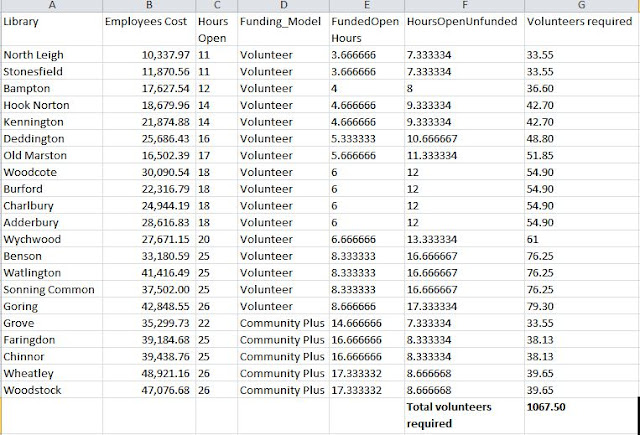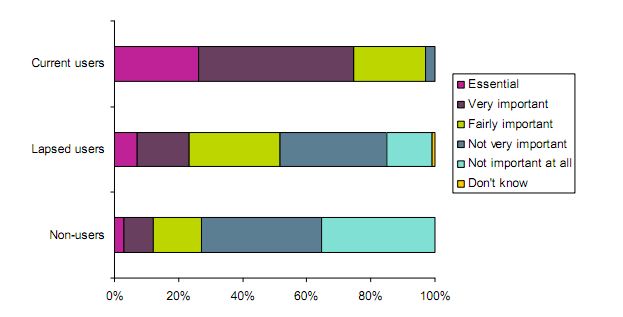Oxfordshire county council are currently going through a consultation on their proposal for the library service. The proposal is based on their Quantitative Analysis based on research on the following five measures:
Where people,
- Live
- Work
- Study
- Shop
- Public Transport Accessibility
Using various different datasets from other public bodies, most of which we are not allowed to see because they are under “commercial license” they have scored each library and then given an aggregate score. They used half a mile around each for their scoring. Obviously this method is clearly going to be biased against rural areas, over 66% of the half mile circle around Wychwood library is fields. Most of Milton Under Wychwood is ignored as is all the surrounding Wychwood villages and schools that use the library. The city libraries are nearly all surrounded by housing, shops, schools and have good public transport in comparison to rural Oxfordshire. To back up this bias against rural libraries, only one library in their city group of libraries has fallen out of the fully funded bracket. OCC say there isn’t a bias and that the measures are fair. Lots of the other library groups are unhappy about this, including me. What I was interested in though was how they came to the conclusion that the measures used were the correct ones.
To back up the five measures their quantitative analysis has this paragraph:
In deciding this, we looked at what people said they wanted from their
library service – focusing particularly on a large-scale survey carried
out by the MLA in November of 2010. This survey emphasises the
importance of where people live and work as to whether or not they use a library service. (Emphasis added)
This is a 198 page series of quantitative and qualitative reports written by the museums and libraries archive council (MLA). We read thought these documents and couldn’t find anywhere that emphasised their premise. When the Wychwoods group gave our presentation to OCC at the library I put this point to them and the acting chief librarian told us there was a mistake and they would look into the apparent misquoting of their source for the premise. A few days later I had a email saying this was what they used to come up with their five measures:
It turns out to be a link to the save Doncaster libraries blog, which in turn links to a FOI request the save Doncaster libraries group put into the MLA.
This was guidance given to Doncaster by the MLA on what should be taken into account when making changes to the library service.
All very odd.
I then asked her for the guidance OCC had received directly from the MLA as some of the points were Doncaster specific, I got this reply:
The checklist I have given you was the one issued to Doncaster but I used it to refer you to the relevance of live, work etc. from MLA’s perspective and that therefore those measures are valid.
I have searched the MLA site, the OCC site and also googled for another copy of this guidance. If it was something that was issued to all councils considering changes to the library service it would pop up elsewhere, it doesn’t.
Resorting to the tedious and time consuming FOI request method I asked OCC and the MLA what email, meeting notes or other correspondence they had between the two bodies on the consultation and any advice given. I received the following response from OCC:
I am writing to inform you that having searched our records and consulted with the appropriate officers the information requested is not held by Oxfordshire County Council.
We subsequently had a meeting with OCC and one of the team working on the QA is adamant that the Quantitative Analysis premise backs up their five measures. They have produced quotes from the QA but this only amounts to 1 page worth of text mainly from focus group responses. The report runs to 198 pages. It isn’t in the premise of the QA or any of the conclusions but they still stand by it.
So to sum up here are the current facts:
- The OCC QA premise is misquoted and they say the QA is based on evidence from a study that doesn’t back up their analytical method.
- They then say actually that is wrong, here is what we used and sent me a link to a blog that in turn links to a FOI request from another group on guidance to Doncaster.
- They have had no communication themselves with the MLA with regards to this consultation and their analysis.
- Even the guidance given to Doncaster doesn't back up their measures really, they have also not demonstrated they have looked into or followed the other points in the Doncaster guidance.
- They then say actually is does come from the MLA report and they stand by it. Even though it doesn’t back up their premise
The MLA future libraries report is actually quite good, it suggests a lot of good ways of saving money. For example up to 15% of library service costs could be saved by sharing back office costs with other authorities. If applied to OCC this would save almost exactly the 2 million they are trying to save. There are ten authorities in the future library program and only Oxfordshire and Kent are looking at replacing staff with volunteers. Kent haven't made their proposals public yet though.
They have made no mention of this research by the MLA, their consultation and proposal totally ignores it. They will say that you cannot share back office costs in rural areas because of the distances involved. I used to commute from Oxfordshire into Cheltenham for two years, it took 40 minutes. I now commute from one part of Oxfordshire to another (Wychwoods to Abingdon) it takes 50 minutes. That argument doesn’t cut the mustard, especially with the technology for remote working we have today.
Below is a graph of the current staffing costs at OCC, we only got this data because of a FOI request. It didn't form part of the consultation. The cuts are in blue:
All of the cuts proposed by their analysis are to rural libraries with the exception of Old Marston. Nothing in the proposal mentions back office savings, savings in the city libraries or in management or service support (the back office).
We always hope for evidenced based policy from public bodies but it seems we rarely get it. It’s a dangerous mix of the nonsense that is the “Big Society” from the councillors and the officers actively ignoring the alternatives trying to save their own skins. Below is the costs to the friends group of the CRB checks and the cost to OCC for the various health and safety training they are going to have to provide for the volunteers.

They are actually going to lose money on this in the first year and won’t see any actual savings until year four, and even those will be minimal. The other costs will reoccur because things like first aid and fire marshal training have to be renewed. I used the sources for the costs that match the certificates for the staff that are on the wall in the library. On the level of volunteers we have a community shop in Ascott and they require 4 part-time staff and 36 volunteers so the numbers of volunteers needed is probably conservative. I also understand that they going to hire a volunteer coordinator on probably around 50-60k a year. They have also said they won't be paying the expenses for the volunteers. I look forward to councillors giving up their allowances in line with this new OCC policy.
Finally, the hard data points they have ignored are issues and salary spend for each library. If you do a score for the best of each working down and then aggregate them you get a score for the most efficient libraries on costs per issue:
The top eleven libraries using this method (they took no account of these numbers in their analysis) are all libraries in the group that is getting its funding cut to a third.
In the meeting we had the other day I accused them of being negligent because they haven’t check the existing data to see if people actually use libraries outside of their home area. It hadn’t even occurred to them. I have asked for the data so I can actually see if people use the local libraries or the library they live/work/shop/study near and see if the flawed premise can even be stood up with real data. The haven't looked at any of the existing data at all, you wouldn't reconfigure any business without looking at how the existing parts of company perform.
OCC have to think again, this isn’t a fair and transparent consultation, the premise and quantitative analysis is flawed, they haven’t done a qualitative analysis to see which libraries are doing a good job and are efficient and which are not. They have no data or evidence to back up the proposals. And crucially it isn’t really going to save them any money, it is going to create a massive bureaucracy to manage all the extra training the volunteers will require by law. This goes before the cabinet in “late autumn” and will be voted on by ten of seventy four Oxfordshire County Councillors, between them the ten councillors were voted for by 2.4% of the 635500 population.
Here are the links to the sources for the data:
The FOI request on spending:
The OCC quantitative analysis:
The data on library salaries and book issues etc.:
The Doncaster blog and FOI:
The links to the volunteer spending for training:
http://www.businesslink.gov.uk/bdotg/action/detail?itemId=1084426773&r.l1=1073858787&r.l2=1073858914&r.l3=1084607697&r.l4=1084415157&r.s=m&type=RESOURCES
http://www.oxfordshire.gov.uk/wps/portal/publicsite/councilservices?WCM_GLOBAL_CONTEXT=http://apps.oxfordshire.gov.uk/wps/wcm/connect/occ/internet%2Fcouncil+services%2Ffire+and+public+safety%2Ffire+and+rescue+service%2Ffire+safety+training%2Fcourses%2F1+-+fps+-+f+-+b+-+com+train+-+fire+marshal
http://www.sja.org.uk/sja/training-courses/course-search.aspx




























